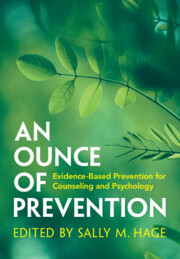Book contents
- An Ounce of Prevention
- An Ounce of Prevention
- Copyright page
- Dedication
- Contents
- Figures
- Contributors
- Acknowledgments
- Part One A Foundation in Prevention
- 1 The Practice and Science of Prevention: Introduction and Overview
- 2 Best Practices for the Evaluation of Prevention Programs
- 3 Critical Features of Prevention Practice: Implementing Prevention That Works
- Part Two Prevention with Children and Youth
- Part Three Prevention with Emerging Adults
- Part Four Across the Lifespan: Adults and Families
- Part Five Closing
- Index
- References
2 - Best Practices for the Evaluation of Prevention Programs
from Part One - A Foundation in Prevention
Published online by Cambridge University Press: 14 November 2024
- An Ounce of Prevention
- An Ounce of Prevention
- Copyright page
- Dedication
- Contents
- Figures
- Contributors
- Acknowledgments
- Part One A Foundation in Prevention
- 1 The Practice and Science of Prevention: Introduction and Overview
- 2 Best Practices for the Evaluation of Prevention Programs
- 3 Critical Features of Prevention Practice: Implementing Prevention That Works
- Part Two Prevention with Children and Youth
- Part Three Prevention with Emerging Adults
- Part Four Across the Lifespan: Adults and Families
- Part Five Closing
- Index
- References
Summary
Program evaluations are a fundamental tool of prevention science. They provide insight into a program’s effectiveness and efficiency by systematically collecting information. There are a wide variety of program evaluation types that can be used across early, intermediate, and later phases of intervention to assess a variety of outcomes. This chapter will discuss using theory of change and logic models and will explore the type of evaluation that may be best suited for different stages of prevention program development (formative, process, or outcome). Program evaluation examples are used to illustrate different techniques. Attention to the sociopolitical context within prevention program evaluations is also discussed.
Keywords
- Type
- Chapter
- Information
- An Ounce of PreventionEvidence-Based Prevention for Counseling and Psychology, pp. 23 - 41Publisher: Cambridge University PressPrint publication year: 2024

